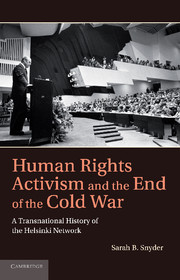Book contents
- Frontmatter
- Contents
- Acknowledgments
- Introduction
- 1 Bridging the East–West Divide
- 2 “A Sort of Lifeline”
- 3 Even in a Yakutian Village
- 4 Follow-up at Belgrade
- 5 Helsinki Watch, the IHF, and the Transnational Campaign for Human Rights in Eastern Europe
- 6 Human Rights in East–West Diplomacy
- 7 “A Debate in the Fox Den About Raising Chickens”
- 8 “Perhaps Without You, Our Revolution Would Not Be”
- Conclusion
- Bibliography
- Index
7 - “A Debate in the Fox Den About Raising Chickens”
The Moscow Conference Proposal
Published online by Cambridge University Press: 01 June 2011
- Frontmatter
- Contents
- Acknowledgments
- Introduction
- 1 Bridging the East–West Divide
- 2 “A Sort of Lifeline”
- 3 Even in a Yakutian Village
- 4 Follow-up at Belgrade
- 5 Helsinki Watch, the IHF, and the Transnational Campaign for Human Rights in Eastern Europe
- 6 Human Rights in East–West Diplomacy
- 7 “A Debate in the Fox Den About Raising Chickens”
- 8 “Perhaps Without You, Our Revolution Would Not Be”
- Conclusion
- Bibliography
- Index
Summary
Over the years of the CSCE Vienna Review Meeting, the Soviet attitude toward compliance with the Helsinki Final Act transformed. The pace and scope of change demonstrated a fundamentally different approach to human rights in the Soviet Union. Western pressure, ineffective for so many years, finally began to result in meaningful improvements, as Soviet leaders recognized they were necessary to improving relations. The new Soviet outlook also shaped the dynamics throughout the region, leading Eastern European governments to adopt a range of responses to demands for greater freedom. This chapter focuses on efforts by Gorbachev and Shevardnadze to prod the Soviet Union and Eastern Europe toward greater compliance with the Helsinki Final Act. Although other observers dispute the suggestion that pressure from Helsinki activists influenced Soviet behavior, I argue the Soviet proposal at the Vienna CSCE Review Meeting to host a conference on human rights in Moscow, as well as subsequent efforts to secure consensus for the proposed meeting, demonstrate the direct and indirect influence of transnational Helsinki activism. A key element of this transformation was the Soviet decision to invite its prominent critics, including the International Helsinki Federation for Human Rights and the Commission, to Moscow in order to secure Western support for its new reform agenda.
- Type
- Chapter
- Information
- Human Rights Activism and the End of the Cold WarA Transnational History of the Helsinki Network, pp. 174 - 216Publisher: Cambridge University PressPrint publication year: 2011

